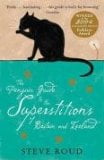 The Penguin Guide to the Superstitions of Britain and Ireland
The Penguin Guide to the Superstitions of Britain and Ireland
by Steve Roud
Penguin, £10.99, ISBN 0140515127
Why is it that, whenever I see a single magpie, I find myself murmuring, “Good morning, Mr. Magpie. I hope you and your family are quite well”? According to this entertaining and informative book, showing respect to this bird by raising your hat or speaking politely is a traditional (well, for the last hundred years or so, anyway) means of warding off misfortune — which seems to be the purpose of the majority of superstitions.
Steve Roud has been researching British folklore for thirty years and so as well as providing a comprehensive list of superstitions, his notes attempt to provide a genuine historical and geographical context for them all, including an earliest known occurrence. His working definition of “superstition” includes a belief in luck, omens, and occult powers, and that coincidences have a deeper meaning than random accident. Given this, it is easy to see why superstition thrives in an atmosphere of fear, uncertainty and perceived lack of control over one’s fate. The carrying of lucky charms and mascots increased dramatically during the First World War, suggesting that such beliefs are not fixed references to some ancient wisdom but can be adopted and then discarded again according to circumstances. The author explicitly rejects the “ancient origins” approach (many of them are probably pure invention anyway) and points out the many common motifs that superstitions share with each other and with folk tales.
Are we as superstitious as we used to be? From the evidence Roud has gathered, along with that from other sources, the answer seems to be “No”. In a survey to find the top ten superstitions in 1998, “Unlucky to walk under a ladder” was mentioned most often — a bit feeble compared to, say, “If two men fight aboard a ship, it will sink within 24 hours.” The entries are arranged alphabetically, cross-referenced, and there is an extensive bibliography, so this is a useful reference book as well as an enjoyable read.
Mike Hutton

